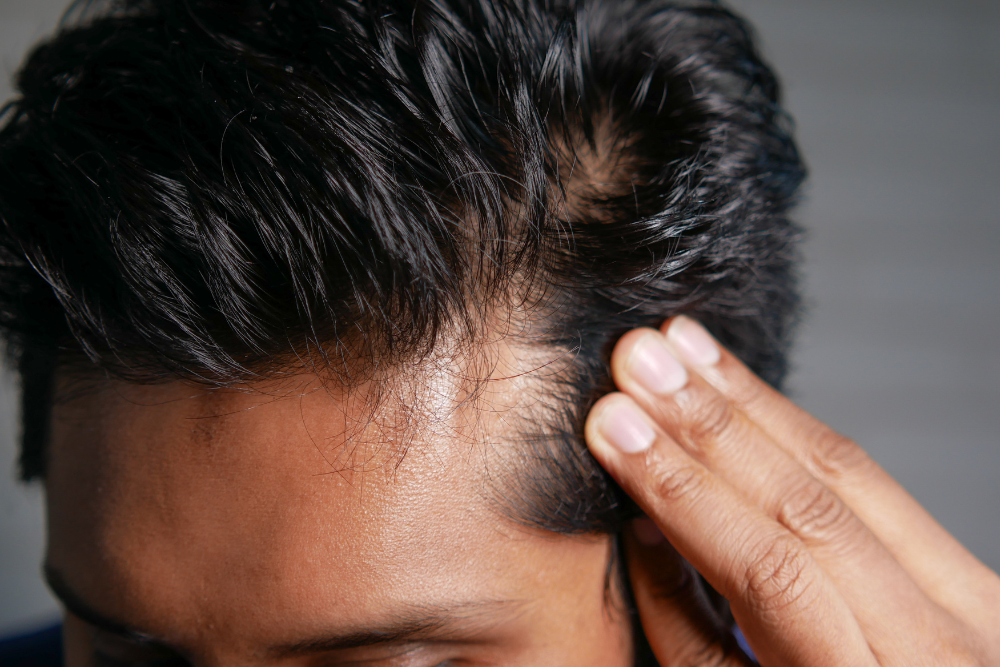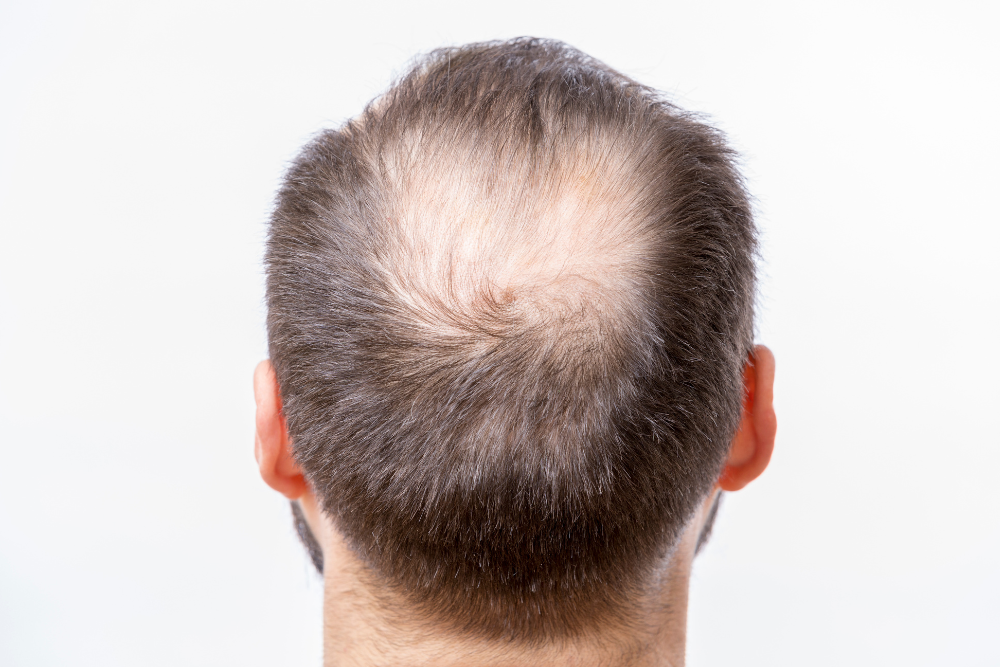Hair loss is a topic that touches many. Whether it’s noticing a few extra strands in the shower drain or dealing with more significant hair thinning, the experience can be distressing. It’s a concern that prompts many to seek answers to understand the root causes behind hair loss.
One factor often overlooked in the search for answers is the role of vitamins in maintaining healthy hair. Just as our bodies require essential nutrients to function optimally, so too does our hair. Vitamins serve as the building blocks for healthy hair growth, contributing to its strength, shine, and resilience.
So, it’s time to dive deep into the relationship between vitamins and hair health, exploring which vitamin deficiency causes hair loss.
Understanding Hair Loss
Before we look into hair loss and its relationship with nutrition, it’s essential to understand the fundamentals of the hair growth cycle. Hair goes through a continuous cycle of growth, transition, and resting phases. This cycle consists of three main stages:
Anagen Phase
This is the active growth phase, during which hair follicles produce new hair cells. The length of this phase varies from person to person but typically lasts anywhere from two to seven years.
Catagen Phase
Following the anagen phase, hair transitions into the catagen phase, a brief intermediate stage where hair growth stops, and the follicle begins to shrink.
Telogen Phase
Finally, hair enters the telogen phase, also known as the resting phase. During this stage, the old hair is shed to make way for new hair growth. This phase lasts for about three to four months before the cycle repeats.
Various factors can disrupt this balance, leading to abnormal hair loss. These factors may include hormonal imbalances, genetic predisposition, medical conditions, stress, and nutritional deficiencies (1).

Different Types of Hair Loss and Their Characteristics
Hair loss can manifest in various forms, each with unique characteristics and underlying causes. Some common types of hair loss include:
Alopecia Areata
This autoimmune condition results in the sudden loss of hair in small, round patches on the scalp or other parts of the body. It occurs when the immune system mistakenly attacks the hair follicles.
Telogen Effluvium
Telogen effluvium is characterised by excessive shedding of hair from the scalp, often triggered by significant stress, illness, hormonal changes, or nutritional deficiencies. Unlike alopecia areata, telogen effluvium typically affects the entire scalp rather than specific patchy hair loss.
Androgenetic Alopecia
Also known as male or female pattern baldness, androgenetic alopecia is the most common form of hair loss, affecting both women and men. It is characterised by a gradual thinning of hair, typically starting at the temples or crown and progressing over time. Genetics and hormonal factors play a significant role in its development.
Importance of Nutrition in Maintaining Healthy Hair
Nutrition plays a vital role in maintaining the health and vitality of our hair (2). Just as our bodies require a balanced diet to function optimally, our hair follicles rely on essential nutrients to support growth and strength. Key nutrients that contribute to healthy hair include vitamins, minerals, protein, and essential fatty acids.
Vitamins, in particular, are vital for hair health, as they provide the building blocks necessary for hair growth and maintenance (3). Deficiencies in certain vitamins can lead to hair loss and other hair-related issues. Therefore, ensuring adequate intake of these nutrients through a balanced diet is the key to promoting healthy hair growth and preventing potential deficiencies.
The Role of Vitamins in Hair Health
Vitamins are organic compounds that play a key role in various physiological processes within the body, including maintaining healthy hair. While the body requires a wide range of vitamins for overall health, some vitamins are particularly important for promoting hair growth and maintenance (3).
Vitamin A
Vitamin A plays an important role in cell growth and differentiation throughout the body, including the scalp and hair follicles. It helps maintain the health of the skin and mucous membranes, including those in the scalp. However, excessive intake of vitamin A or a deficiency can lead to hair loss. While too much vitamin A can be toxic and cause hair loss as a side effect, a deficiency can also result in dry, brittle hair and eventual hair loss.
Vitamin C
As a potent antioxidant, vitamin C protects the hair follicles from oxidative stress caused by free radicals. Additionally, it plays a vital role in collagen synthesis, which is essential for maintaining the structure and strength of hair. A deficiency in vitamin C can weaken the hair shaft, leading to brittle hair that is prone to breakage. Insufficient collagen production can also result in hair that is dull and lacking in lustre.
Vitamin D
Vitamin D is known as the “sunshine vitamin” because it is synthesised by the body when the skin is exposed to sunlight. It plays a crucial role in regulating hair follicle cycling and promoting hair growth. Research suggests that low levels of vitamin D deficiency may be associated with conditions such as alopecia areata and telogen effluvium, both of which can cause hair loss. Ensuring an adequate intake of vitamin D through sunlight exposure and dietary sources is essential for maintaining healthy hair growth.
Vitamin E
Vitamin E is another powerful antioxidant that helps protect the scalp and hair follicles from oxidative damage. It also promotes blood circulation to the scalp, ensuring that hair follicles receive an adequate supply of nutrients and oxygen. Deficiencies in vitamin E can lead to dry, brittle hair that is prone to breakage. By supporting blood flow to the scalp, vitamin E helps nourish the hair follicles and promote healthy hair growth.
Understanding the role of each of these vitamins in maintaining healthy hair growth is essential for identifying and addressing vitamin deficiencies that may contribute to hair loss.

Dietary Sources of Essential Vitamins for Hair Health
One of the most effective ways to ensure adequate intake of essential vitamins for hair health is through a balanced diet. Incorporating foods rich in the following vitamins can help promote healthy hair growth:
Vitamin A: Sources include sweet potatoes, carrots, spinach, kale, and eggs.
B-Complex Vitamins: Foods rich in B vitamins include whole grains, lean meats, fish, eggs, dairy products, legumes, nuts, and seeds.
Vitamin C: Citrus fruits, strawberries, capsicum, kiwi, and broccoli are excellent sources of vitamin C.
Vitamin D: While sunlight is the primary source of vitamin D, dietary sources include fatty fish (e.g., salmon, mackerel), fortified dairy and plant-based milk, eggs, and mushrooms.
Vitamin E: Nuts, seeds, leafy greens, avocado, and vegetable oils (such as sunflower, safflower, and olive oil) are good sources of vitamin E.
Incorporating a variety of these nutrient-rich foods into your diet can help ensure that you’re getting the vitamins necessary for healthy hair growth.
Supplements
In some cases, dietary supplements may be necessary to address vitamin deficiencies effectively. However, it’s essential to approach supplementation with caution and under the guidance of a healthcare professional. Taking excessive amounts of certain vitamins can be harmful and may even worsen hair loss. Before starting any supplements, consult with your healthcare provider to find out if they’re appropriate for you.
Lifestyle Changes
As well as maintaining a balanced diet, adopting a healthy lifestyle can also support optimal hair health. Managing stress levels, getting regular exercise, and prioritising adequate sleep are all important factors in maintaining overall well-being, which can indirectly impact hair health. Chronic stress, for example, can contribute to hair loss by disrupting the hair growth cycle. By adopting healthy lifestyle habits, you can help mitigate the effects of stress on your hair and promote a healthy scalp environment (4).
Complementary Treatments
In addition to addressing vitamin deficiencies through dietary changes, supplementation, and lifestyle changes, prescription tablets and topical hair loss treatments offer valuable options for combating hair loss. When prescribed by a healthcare provider, these treatments can complement nutritional interventions, providing a comprehensive approach to promoting healthy hair growth.
Prescription Tablets (5-alpha-reductase inhibitors (5ARIs))
These medications effectively block the enzyme 5 alpha-reductase, which converts testosterone into dihydrotestosterone (DHT), a hormone associated with hair loss. By inhibiting DHT production, prescription tablets promote new hair growth and prevent further loss. When used alongside dietary improvements aimed at addressing underlying nutritional deficiencies, 5ARIs offer a synergistic approach to supporting healthy hair growth from both inside and outside the body (5).
Topical Treatments
Applied directly to the scalp, topical hair loss medications stimulate hair follicles to enter the growth phase of the hair cycle, promoting increased hair growth and density. While the exact mechanism of action is not fully understood, these treatments can effectively boost hair growth. When combined with dietary adjustments aimed at promoting optimal nutrient intake, topical treatments provide a holistic approach to addressing hair loss, ensuring that the scalp receives the necessary nutrients to support healthy hair growth.
By integrating prescription tablets and topical treatments with nutritional interventions, you can leverage the combined benefits of these approaches to help achieve healthier, fuller hair.

Professional Guidance
If you’re experiencing significant hair loss or suspect a vitamin deficiency may be contributing to your hair woes, don’t hesitate to seek professional guidance. A healthcare provider, dermatologist, or registered dietitian can help assess your specific needs, identify any underlying issues, and recommend appropriate treatment options. They may also conduct blood tests to determine your nutrient levels and provide personalised advice tailored to your circumstances.
Remember, addressing hair loss due to vitamin deficiencies requires a multifaceted approach that includes dietary adjustments, lifestyle changes, and, in some cases, supplementation under professional guidance. By taking proactive steps to address vitamin deficiencies and support overall hair health, you can promote healthy hair growth and restore confidence in your locks.
Take a step towards healthier hair today – explore options for hair loss at hub.health.
Sources:
Mayo Clinic. Hair Loss [internet]. 2024 [cited 25 July 24]. Available from: https://www.mayoclinic.org/diseases-conditions/hair-loss/symptoms-causes/syc-20372926
National Library of Medicine. Diet and hair loss: effects of nutrient deficiency and supplement use [internet]. 2017 [cited 25 July 24]. Available from: https://www.ncbi.nlm.nih.gov/pmc/articles/PMC5315033/
National Library of Medicine. The Role of Vitamins and Minerals in Hair Loss: A Review [internet]. 2019 [cited 25 July 24]. Available from: https://www.ncbi.nlm.nih.gov/pmc/articles/PMC6380979/
National Library of Medicine. Influence of Nutrition, Food Supplements and Lifestyle in Hair Disorders [internet]. 2022 [cited 25 July 24]. Available from: https://www.ncbi.nlm.nih.gov/pmc/articles/PMC9650738/
National Library of Medicine. Use of 5-Alpha Reductase Inhibitors in Dermatology: A Narrative Review [internet]. 2023 [cited 25 July 24]. Available from: https://www.ncbi.nlm.nih.gov/pmc/articles/PMC10366043/





